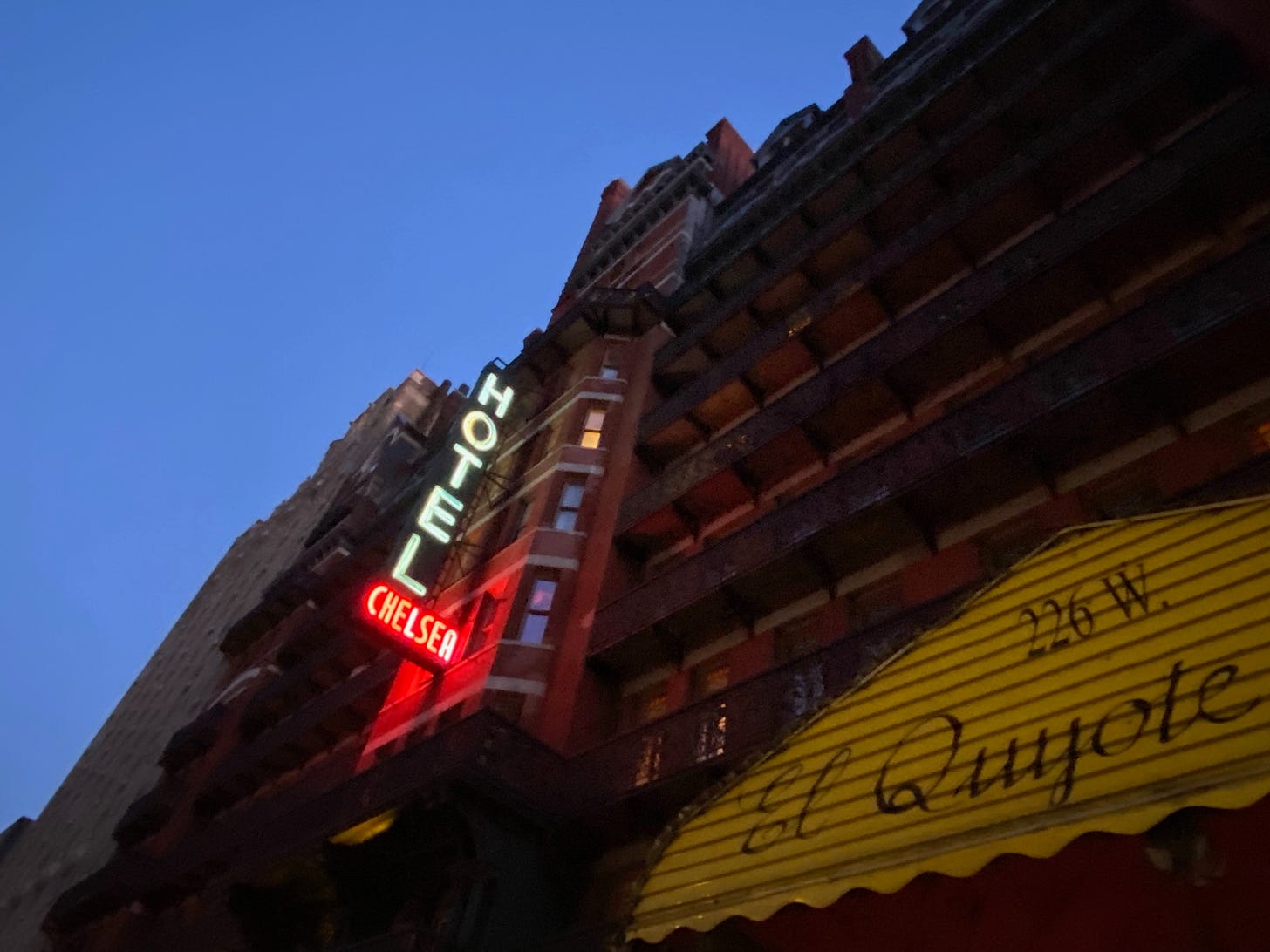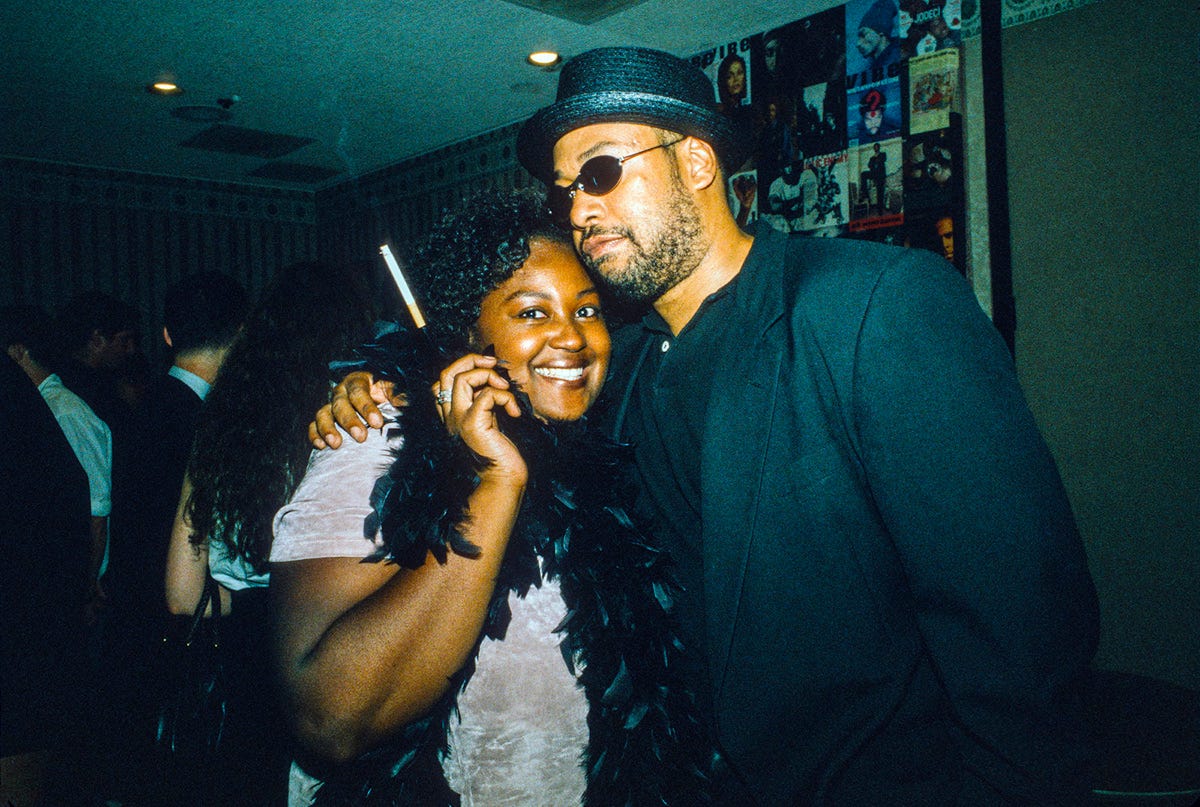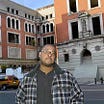Ethan Hawke Was Here: On Hotel Chelsea & Romance in the ’90s
Michael A. Gonzales reminisces about creativity, charm and a cinema star in 1990s Chelsea.

“You know, if you want to be a Catholic priest, you might make a trip to Notre Dame or something like that. But if you dream of being a bohemian weirdo, then your mecca is the Chelsea Hotel.” --Ethan Hawke, 2002
In 1993 my girlfriend Lesley Pitts and I moved into a first floor flat in Chelsea. A full-figured woman with braids, mad style and a wicked sense of humor, Lesley had lived with me for two years. We had previously resided on the Upper West Side where, we subleased a studio from a crazy poet. Though we gave her the rent check every month, the shady scribe stopped sending the money to the landlord.
After Thanksgiving dinner in Irvington, New Jersey with Lesley’s parents, we came home to an eviction notice. “You gotta admit, it’s the perfect metaphor for Thanksgiving,” I said. Lesley glared at me. “That shit isn’t funny,” she replied. Luckily things went well in housing court after a friend schooled us on the system. Still, we had to vacate within three months.
The apartment search was tedious and included checking out a one-bedroom where a roach the size of Gregor Samsa was floating in the toilet. Finally, we lucked upon an apartment house on West 22nd Street between 7th and 8th. I’d been in love with Chelsea since I was a teenager taking the subway from 145th and Broadway to 23rd and 7th Avenue and walking a few blocks to Danceteria years before.
We moved into apartment 1-E in February. The one-bedroom was small, but just right for us. The former tenants had split the living room with a wall and made a nursery. “We can turn this into your office,” Lesley promised. Another reason we chose the place was because Lesley’s job was a few blocks away; she was employed by Jive Records, where she was the publicist for A Tribe Called Quest, while I worked in the recreation department of downtown homeless shelter. I also wrote hip-hop articles for The Source, Billboard, and Vibe.

Many mornings I walked Lesley to work and then went to the coffee shop on 22nd Street and 7th Avenue. Sipping from a large cup, I’d flip through magazines while people watching from the window. It was during that time that I began noticing actor Ethan Hawke walking through the neighborhood. As a native New Yorker, it takes more than fame to make me excited, but it was kind of wild when I realized he lived in the infamous Hotel Chelsea.
Passing by one afternoon, I saw Hawke coming out the door and thought, How cool. When I was younger, I mythologized the boho badness I believed many of the former residents shared, especially writers Virgil Thompson, William Burroughs, and The Lost Weekend novelist Charles Jackson, who committed suicide there in 1968. The Chelsea was “nearly a slum” according to playwright Arthur Miller, who moved there after his divorce from Marylyn Monroe, but the building represented a level of hip that remained steady for decades.
I’d long thought about checking in, but I never did. However, one night after having a few carafes of sangria at El Quijote, I waltzed into the hotel’s lobby and checked out the many paintings on the wall. Like a tourist in my own town, I took a deep breath and thought about the numerous artistic achievements that had happened within the twelve stories of that red brick building.
After leaving the theater one cloudy day, I spotted Hawke outside, smoking a cigarette and looking very much like a Chelsea man. Born in 1970, the former teen actor was still in his twenties, but no longer the wholesome kid from Explorers. He had that scruffy artist look of a person who read Dylan Thomas at breakfast, studied Jackson Pollock paintings at lunch, and made love to the sounds of Charlie Parker.
“He always looks like he needs a bath,” Lesley observed one morning when we saw Hawke as we stood on 23rd Street waiting for the light to change. “Be nice, he’s going through his Kerouac phase,” I replied. Beat boy Jack was another veteran of the Chelsea. As a former English major, Lesley knew exactly what I meant.
Hawke crossed the street with a swagger that exuded a tortured masculinity and existential angst; I could easily imagine Ethan drinking and smoking too much as he scribbled profound thoughts, notes, and meditations into a notebook, hoping they’d be fueled into some brilliant project.
Writers often believe in the superstition that there exists one place that will inspire progress and literary greatness, a location infused with creative spirits of past residents or patrons whose genius will somehow seep into our DNA and make us brilliant. However, one night, while taking the long way home, walking beneath the hotel’s neon sign and wrought-iron balconies, I realized I had already missed the many movements that had jumped off behind the Chelsea walls.
The party was over at 222 West 23rd, but around the corner we were just getting started.
***
The Hotel Chelsea has a reputation for being haunted, but I believed that those creative spirits soared around the neighborhood, creeping through open windows and settling on comfortable couches like the green leather one in my office. Arriving home from work after 11, I went into night owl writer mode, knocking out profiles and a weekly column (Black Metropolis) for New York Press.
Though I’d been publishing since I was a teen, it wasn’t until Lesley and I moved in together that I felt like a “real writer.” I credit Lesley with being a wonderful in-house editor and motivator. She also kept me grounded while also discovering cool places for us to hang such as Ciel Rouge, an intimate spot two blocks away where we often met for cocktails and cigarettes. One night in the summer of 1997, she threw me a party to celebrate the Erkyah Badu cover story I’d written for Essence. Two hours later there was a conga line of friends back to our place.
If those apartment walls could talk, they’d have tales of after work parties, Thanksgiving feasts, loud arguments, date nights watching The X-Files (with takeout from Noodle Corner), intoxicated Friday nights with our friend Sheila Jamison, hungover Saturday mornings with Big Cup coffee, and Sunday morning shopping alongside hulk-sized firemen at the A&P, followed by a daytrip to the flea market. Finding cooking to be therapeutic, Lesley prepared wondrous meals on Sunday evenings while blaring Al Green songs.
Once I suggested listening to my favorite rock group and she laughed. “Do you want the food to taste like Al Green or Led Zeppelin?”
I kissed her on the forehead. “You win.”
In the six years we dwelled in that space, our apartment, much like the Hotel Chelsea motto, became “a rest stop for rare individuals” who included writers Darius James and Frank Owen, artist Matt Reid, filmmakers Marjorie Clarke and Jerry Rodriguez, rockers Tricky and Daniel Chavis (The Velt), journalists Amy Linden and Robert (Bob) Morales, publicists Wendy Washington and Audrey LaCatis, photographers Alice Arnold and Carl Posey, and magazine editors Selwyn Seyfu Hinds and Danyel Smith, who spent countless hours there when she was going through a divorce.
At some point, Ethan Hawke disappeared from the neighborhood. We were surprised when it was announced that he was marrying Uma Thurman. “She cleaned him up,” Lesley joked. They were married on May 1, 1998. A few months later, Lesley and I ran into him at a Knicks game at Madison Square Garden. Lesley thought he and a buddy were sitting in our seats and started a small squabble.
Through it all, Hawke was pleasant. “I have season tickets; I sit in the same seats all the time,” he said with a smile. In the end, Lesley realized that she was wrong and apologized.
“Did you recognize who that was?” she asked as though I’d suddenly been struck blind.
“Of course I realized who it was; I told you before about giving Ethan Hawke a hard time.”
***
Fast forward to the summer of 2002, and I’m sitting alone in a quarter full movie theater. It was a different millennium and, post- 9/11, a different world. Tragically, Lesley died suddenly on August 3, 1999 from a brain aneurysm and I left Chelsea for Brooklyn. Weeks after the second anniversary of her passing, I saw a newspaper ad for Ethan Hawke’s directorial debut, Chelsea Walls. Based on an off-Broadway play by Nicole Burdette, from the title I knew what it was about and felt obligated to be in the audience on opening day.
Overflowing with anticipation, angst and the joy of yesteryear memories, I sensed the Chelsea spirits surrounding me as the house lights slowly faded.
Michael A. Gonzales has written essays for Wax Poetics, Catapult, Oldster, CrimeReads, The Paris Review, Longreads and LitHub. His fiction has appeared in Killens Review, Oxford American, Ellery Queen Mystery Magazine and the Magazine of Fantasy & Science Fiction.






I lived in the Chelsea Hotel from 1997 to 1999. I used to see Ethan Hawke there all the time and then at The Hog Pit where I worked as a waitress. Ethan used to like to have readings in the back room. The chairs were put in a circle and they would sit with scripts and read. We had a few nice chats and he was bummed when the Hog Pit moved to the Flat Iron District. I met the most amazing artists those two years. It absolutely inspired my art work at the time.
Michael, this is such a beautiful piece of reverence in prose. I'm so sorry for Lesley's loss. Ethan Hawke moved to my neighborhood in Brooklyn, I believe. I used to see him around there all the time, but I did see him wandering around Chelsea years earlier. Also, have you read Don't Call Me Home by Alex Auder? She grew up in the Chelsea Hotel in the 70s and just wrote a brilliant memoir about it. I feel like you'd love it!